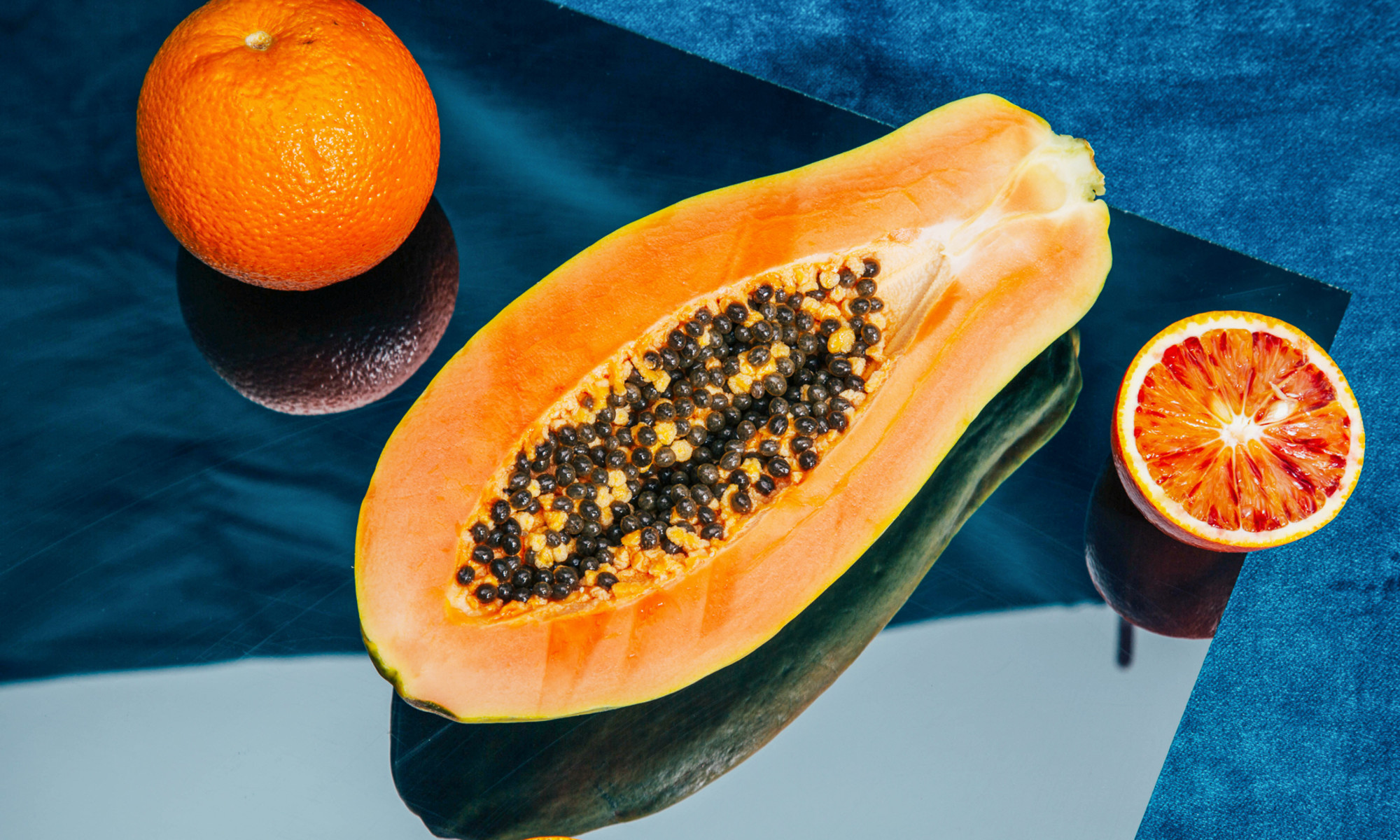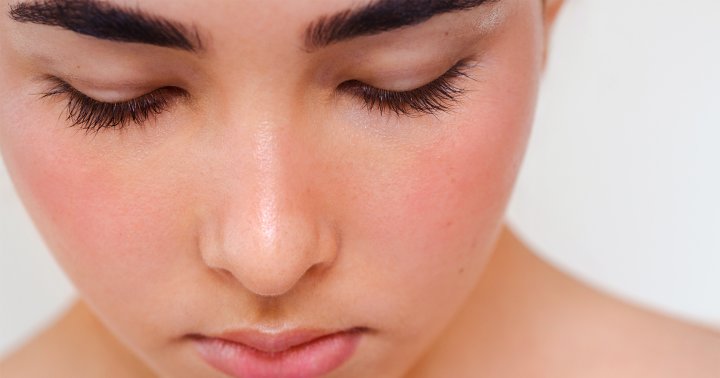Uh, Do Papaya Seeds Actually Kill Parasites? We Asked A Gastro
PS, they're not the only fruit seed you can eat

Image by Carmen Palma / Stocksy July 24, 2023 Our editors have independently chosen the products listed on this page. If you purchase something mentioned in this article, we may While papayas might be most well-known for their vibrant flesh and fruity flavor, their seeds also pack a punch when it comes to nutrition. But can they cure cancer and kill parasites? Probably not. We dove into the science and reached out to a few experts to determine which health benefits of papaya seeds are real and which ones are just social media hype.
Advertisement
This ad is displayed using third party content and we do not control its accessibility features.
Papaya seeds nutritional value
Papaya seeds are the dark, round seeds found nestled in the center of the papaya fruit. They have a crunchy texture and a bitter, peppery flavor that’s often compared to wasabi.
Though papaya seeds are often discarded in favor of the fruit’s sweet, buttery flesh, these small seeds are actually edible and even offer a few important nutrients1, including antioxidants, fiber, and heart-healthy fats.
They've recently been in the spotlight on social media, with some claiming that they can help kill off intestinal parasites and boost gut health. (But more on that later.)
Advertisement
This ad is displayed using third party content and we do not control its accessibility features.
Benefits of papaya seeds
Not only are they rich in fiber and antioxidants, but papaya seeds might also be linked to a few health benefits. Note that most research on them has been done in animal or cell models though, so take the findings with a grain of salt.
1.
They might have cancer-fighting properties (but we need more research to be sure)
“Papaya seed extract has been researched for anticancer effects,” says Amanda Sauceda, MS, RDN, a registered dietitian that specializes in gut health.
She points to a recent test-tube study, which found that both the leaves and seeds of papaya fruit demonstrated anti-cancer effects2 on oral cancer cells. Another preclinical study had similar findings, noting that the black seeds in papaya could reduce the growth of prostate cancer cells.
However, most research is currently limited to studies conducted in test-tubes. Therefore, more high-quality studies are needed to understand how papaya seeds might affect cancer growth in humans.
Advertisement
This ad is displayed using third party content and we do not control its accessibility features.
2.
They contain digestion-supporting fiber
3.
They could benefit brain function.
According to Sauceda, papaya seeds might be beneficial for brain health. Again, research in humans is lacking here, but Sauceda tells mindbodygreen that one animal study did find promising results.
“This was a study done with mice and papaya seed extract and the pulp of papaya,” she says. “While the study found that the pulp had more neuroprotective effects7, there were some benefits with the papaya seed extract.”
Other preclinical research has found that papaya seeds could help protect against oxidative stress8, which could be beneficial for certain neurodegenerative conditions, such as Alzheimer’s. Still, more studies in humans are needed before any definitive conclusions can be drawn.
Advertisement
This ad is displayed using third party content and we do not control its accessibility features.
4.
They may prevent organ damage.
Thanks to their impressive antioxidant content, papaya seeds could potentially block damage to important organs, including the liver and kidneys. While further research in humans is still needed, a few studies in animals have shown some benefits.
For example, one 2021 animal study found that administering papaya seed extract to rats for 12 weeks was able to protect against liver damage9 by reducing oxidative stress, inflammation, and liver scarring. In another study, papaya seed extract helped preserve kidney function10 in rats by reversing damage induced by paracetamol, a type of pain reliever.
Do they work against parasites?
Papaya seeds have become a trendy topic on TikTok lately, with some users claiming that filling up on these tiny seeds can prevent or even help kill off intestinal parasites. But is there actually any truth to back this up?
Saurabh Sethi, MD, MPH, a gastroenterologist, emphasizes that it’s important to rely on scientific evidence rather than social media trends for medical advice. “Although some studies suggest the anthelmintic (antiparasitic) potential of papaya seeds, the available research is limited and inconclusive,” says Sethi.
Sauceda agrees, explaining that one study did find that fortifying corn flour with ground papaya seeds helped with a childhood deworming program11 in Africa, but notes that there’s not a lot of other evidence to suggest that papaya seeds offer any benefits for treating parasites in humans.
If you’re concerned about intestinal parasites, checking in with a doctor is your best bet. “Healthcare professionals can conduct diagnostic tests, such as stool sample analysis, to detect parasite eggs, larvae, or other indicators,” says Sethi. He also points out that adhering to recommendations from a doctor can ensure that you get an accurate diagnosis and can start the appropriate treatment.
Advertisement
This ad is displayed using third party content and we do not control its accessibility features.
Incorporating papaya seeds into your diet
Papaya seeds are safe to eat as is, with no soaking, cooking, or drying required. However, they can be slightly bitter, so they may work best paired with other ingredients to help balance the flavor.
Consider adding them to salad dressings, sauces, and marinades or throwing them into your favorite smoothie recipes, like our calming papaya smoothie. You can also try baking and grinding them for an easy swap for black pepper that packs some fiber.
The best way to get your hands on them is by simply slicing open a papaya and scooping out the seeds. Store your seeds in an airtight container and keep them in the fridge to help maximize their shelf life. Be sure to enjoy in moderation and stick to a few servings of papaya seeds per day, or around 2-3 ounces total.
Saving your papaya seeds instead of tossing them is a great way to cut back on food waste, as they make up around 15-20%12 of the total weight of each fruit. Besides papaya seeds, there are many other edible seeds that are also often discarded. In fact, the seeds of watermelon, squash blossoms, and pomegranates can all work well as tasty, nutritious, and sustainable snacks.
Frequently Asked Questions
Are papaya seeds safe to eat raw?
You can eat papaya seeds raw, roasted, or dried. However, keep in mind that they have a bitter, peppery flavor, so eating a handful scooped straight from the fruit might not be the tastiest way to enjoy them. Consider adding them to smoothies or salads instead.
What does eating too many papaya seeds do?
According to Sethi, while enjoying papaya seeds in moderation is likely safe, going overboard might have some negative effects on health. “Excessive consumption could lead to gastrointestinal disturbances, including stomach irritation, nausea, or diarrhea,” he says. Stick to 2-3 ounces a day to be safe.
Do papaya seeds have benefits for skin?
Papaya seeds are a good source of antioxidants, which can keep your skin glowing and smooth by alleviating inflammation and protecting against sun damage. A 2012 animal study also found that papaya seed extract could help promote wound healing in rats, though more human research is still needed.
The takeaway
Papaya seeds can bring a peppery zip of flavor to many recipes, such as sauces, salad dressings, and marinades. They also provide several important nutrients, including antioxidants, fiber, and heart-healthy fats. While you shouldn't expect your papaya seeds to have any parasite-busting properties, feel free to eat them the next time you cut open a papaya and want to minimize food waste and maximize fiber intake.
Want to turn your passion for wellbeing into a fulfilling career? Become a Certified Health Coach! Learn more here.

 Aliver
Aliver 

































